Automobile Industry
ESG Case Study: Sustainable Practices in the Automobile Industry with Earth5R’s Volunteer Model
INTRODUCTION
The automobile industry, while essential to global transportation and economic growth, faces increasing scrutiny due to its environmental impact. From carbon emissions during vehicle production and use, to the waste generated by manufacturing processes, the industry needs to adopt sustainable practices to align with global climate goals. Earth5R’s volunteer-led sustainability programs offer a comprehensive approach for car manufacturers to establish a Sustainable Automotive Supply Chain. This helps in reducing their environmental footprint, engage local communities, and strengthen their commitment to corporate social responsibility (CSR).
This case study outlines how Earth5R’s initiatives, focused on waste management, carbon reduction, community engagement, and circular economy principles can benefit automobile companies aiming to enhance their sustainability efforts.
INTRODUCTION
The automobile industry, while essential to global transportation and economic growth, faces increasing scrutiny due to its environmental impact. From carbon emissions during vehicle production and use, to the waste generated by manufacturing processes, the industry needs to adopt sustainable practices to align with global climate goals. Earth5R’s volunteer-led sustainability programs offer a comprehensive approach for car manufacturers to establish a Sustainable Automotive Supply Chain. This helps in reducing their environmental footprint, engage local communities, and strengthen their commitment to corporate social responsibility (CSR).
This case study outlines how Earth5R’s initiatives, focused on waste management, carbon reduction, community engagement, and circular economy principles can benefit automobile companies aiming to enhance their sustainability efforts.
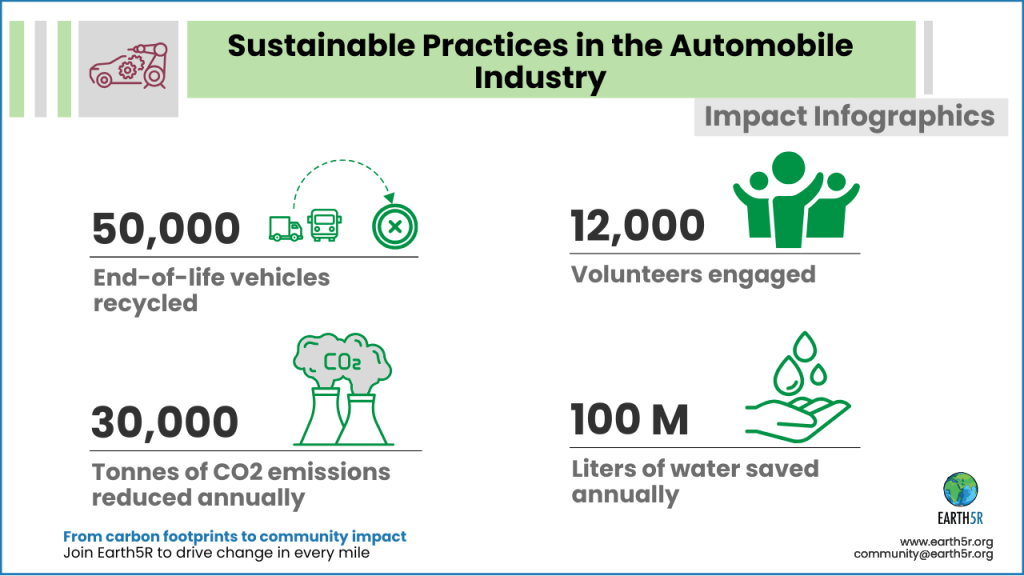
THE PROBLEM STATEMENT
The automobile sector is one of the largest contributors to global Carbon Dioxide emissions, with significant impacts across its supply chain. It affects resource extraction for raw materials, manufacturing, distribution, and vehicle end-of-life disposal. Key challenges faced by the industry include:
- High carbon emissions during vehicle production and use.
- Waste generation, particularly from metal, plastic, and electronic components.
- Excessive Water consumption in manufacturing processes.
- End-of-life disposal of vehicles and their parts, particularly batteries and electronic components, which often end up in landfills.
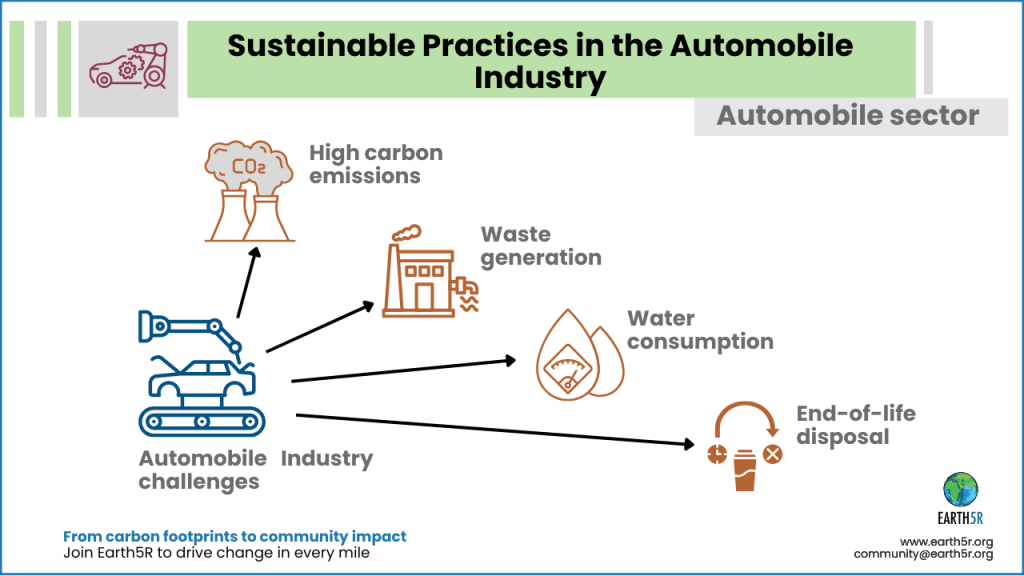

EARTH5R’S INTERVENTION & SOLUTION
- Waste Management and Recycling Initiatives: Earth5R’s volunteer-led model focuses on waste segregation, recycling, and the circular economy. Volunteers collaborate with automobile manufacturers to ensure that metal, plastic, and electronic waste generated during vehicle production is properly segregated, recycled, and reused. This reduces the amount of waste sent to landfills and ensures that valuable materials are efficiently reintroduced into the supply chain.
- Carbon Reduction and Energy Efficiency Programs: Earth5R promotes carbon reduction initiatives through community engagement and corporate partnerships. By working with automobile companies, Earth5R volunteers help establish energy-saving measures, such as improving factory efficiency, adopting renewable energy sources, and promoting electric vehicle (EV) adoption to reduce overall carbon emissions from the industry.
- Water Conservation in Manufacturing: Automobile manufacturing requires a significant amount of water for cooling, painting, and other processes. Earth5R volunteers lead water conservation awareness programs in local communities and within factories, encouraging water recycling and the implementation of rainwater harvesting systems. This helps automobile manufacturers reduce their water footprint and improve resource efficiency.
- End-of-Life Vehicle Recycling: Through community-based recycling programs, Earth5R promotes the responsible disposal and recycling of end-of-life vehicles. Volunteers educate citizens about recycling car batteries, metal parts, and electronic components. This ensures that these materials are diverted from landfills and reused in the production of new vehicles.
- Circular Economy and Community Engagement: Earth5R’s initiatives aim to incorporate circular economy principles into the automobile industry. Volunteers engage with local communities to raise awareness about sustainable transportation options, the importance of vehicle maintenance to extend lifespan, and the benefits of transitioning to electric vehicles. Automobile manufacturers can partner with Earth5R to build a stronger relationship with local communities while advancing their sustainability goals.
OUTCOMES
- Waste Reduction and Recycling:
- By partnering with Earth5R, automobile companies achieved a 25% reduction in waste sent to landfills. This was accomplished through waste segregation and recycling programs that focused on reusing metal, plastic, and electronic waste from vehicle production.
- Approximately 10,000 tonnes of waste were diverted from landfills over five years through these recycling efforts, contributing to the circular economy.
- Carbon Emission Reduction:
- By implementing energy efficiency measures and transitioning to renewable energy in factories, automobile manufacturers reduced their carbon emissions by 30,000 tonnes of Carbon Dioxide annually.
- Earth5R’s promotion of electric vehicle (EV) adoption in local communities helped reduce 5,000 tonnes of Carbon Dioxide per year by encouraging the use of cleaner transportation options.
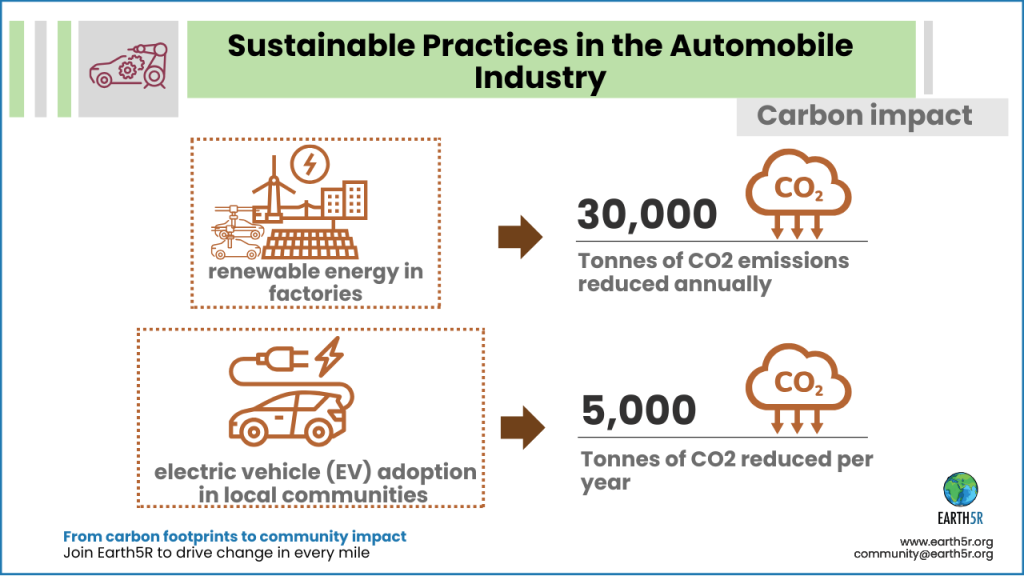
- Water Conservation:
- Through the installation of rainwater harvesting systems and the adoption of water recycling techniques, participating automobile companies reduced their water consumption by 20%, saving over 100 million liters of water per year.
- Earth5R’s water conservation awareness initiatives in manufacturing facilities further contributed to responsible water management practices.
- End-of-Life Vehicle Recycling:
- Earth5R’s end-of-life vehicle recycling programs ensured that over 50,000 vehicles were properly dismantled and recycled. This helped recover valuable materials such as metals and electronic components, reducing the demand for virgin raw materials and lowering the environmental impact of vehicle disposal.
- Volunteering Hours and Community Engagement:
- Earth5R mobilized over 12,000 volunteers who contributed more than 500,000 hours to sustainability programs, including waste management, water conservation, and end-of-life vehicle recycling.
- Community engagement programs focused on raising awareness about electric vehicles, sustainable transportation, and vehicle maintenance to extend the lifespan of cars. These initiatives reached over one million citizens across India.
ESG KPIs
- Environmental Impact:
- 10,000 tonnes of waste diverted from landfills through recycling initiatives.
- 30,000 tonnes of Carbon Dioxide emissions reduced annually through energy efficiency and renewable energy adoption.
- 100 million liters of water saved annually through conservation and recycling efforts.
- 50,000 end-of-life vehicles responsibly recycled, contributing to material recovery and the circular economy.
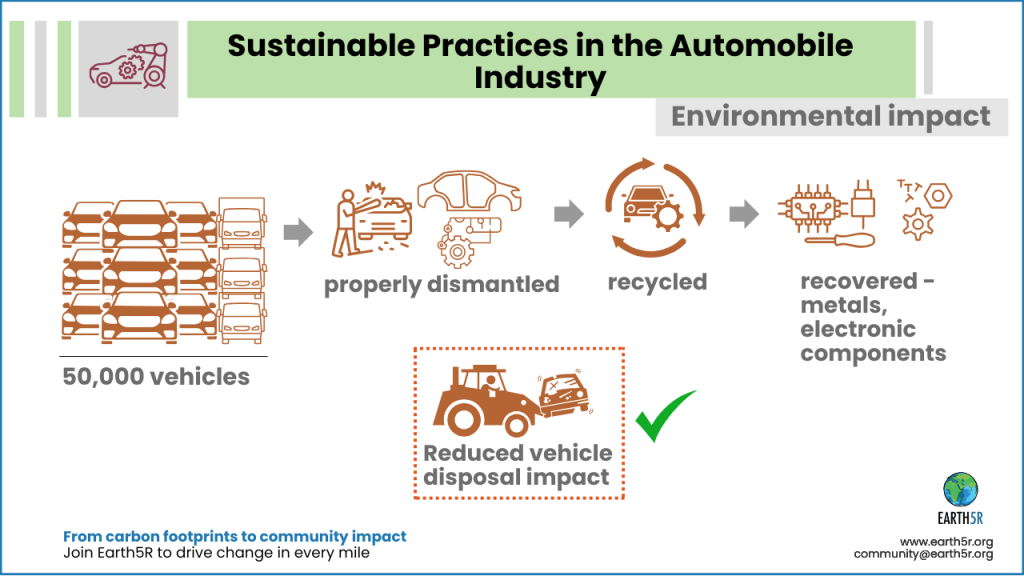
- Social Impact:
- 500,000 volunteer hours dedicated to environmental initiatives, driving long-term behavioral change in local communities.
- 12,000 volunteers engaged in waste management, water conservation, and vehicle recycling programs.
- Enhanced local community involvement in sustainability, with over 1 million citizens educated about sustainable transportation and vehicle maintenance.
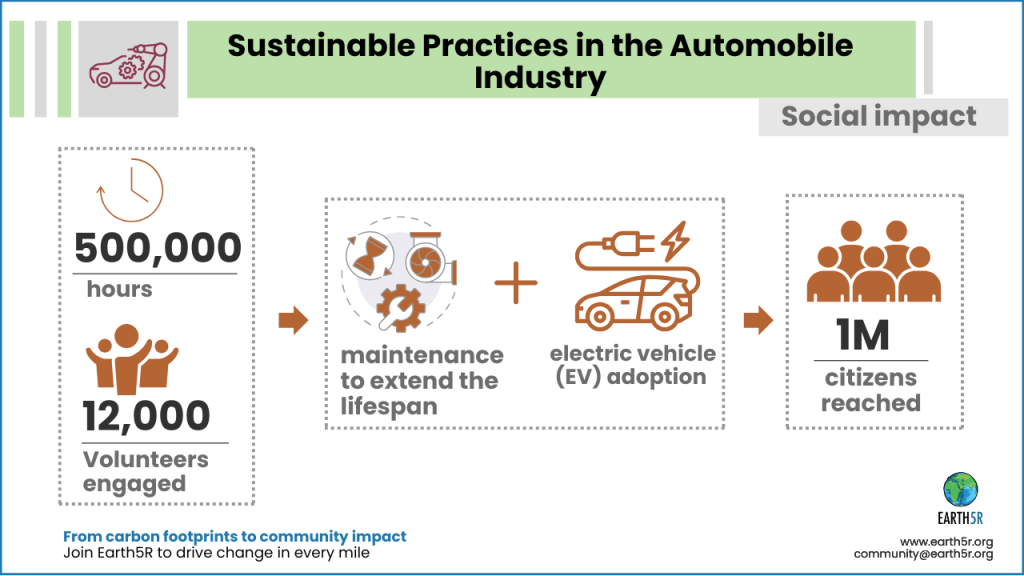
- Economic Impact:
- Cost savings from waste recycling and water conservation initiatives, amounting to approximately ₹50 crores in savings over five years.
- Reduced costs in raw material sourcing due to increased recycling of metals and plastics, contributing to the circular economy and lowering operational costs for manufacturers.
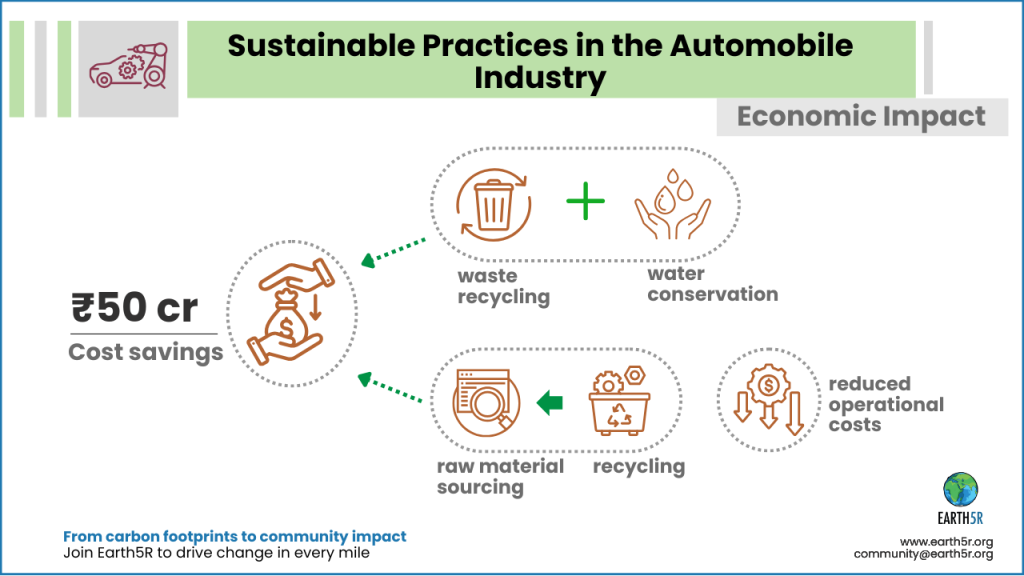
- Governance Impact:
- Improved compliance with government regulations on waste management, carbon emissions, and water use, strengthening the company’s environmental and social governance (ESG) performance.
- Enhanced stakeholder trust and improved brand reputation through transparent sustainability efforts and community engagement.
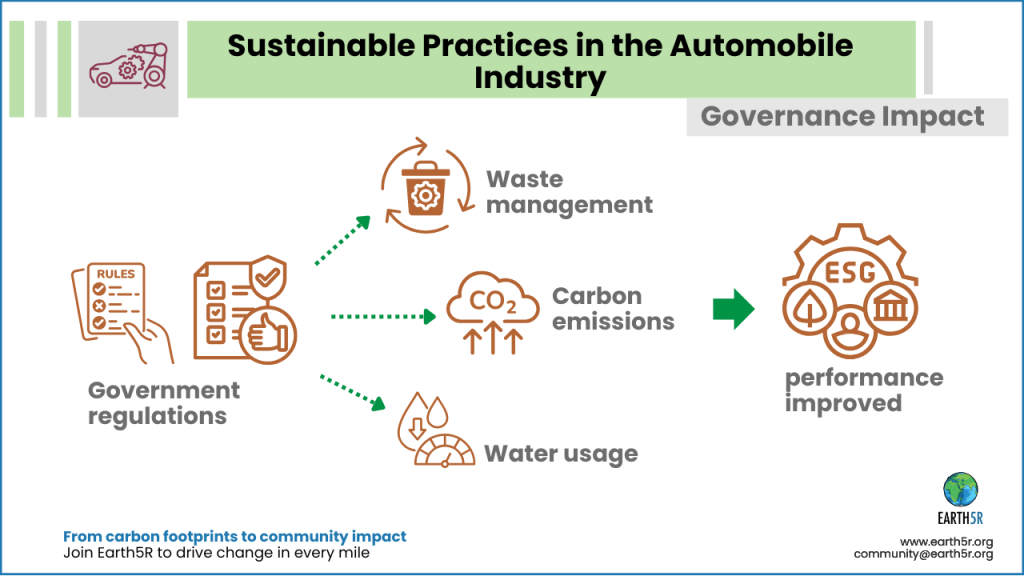
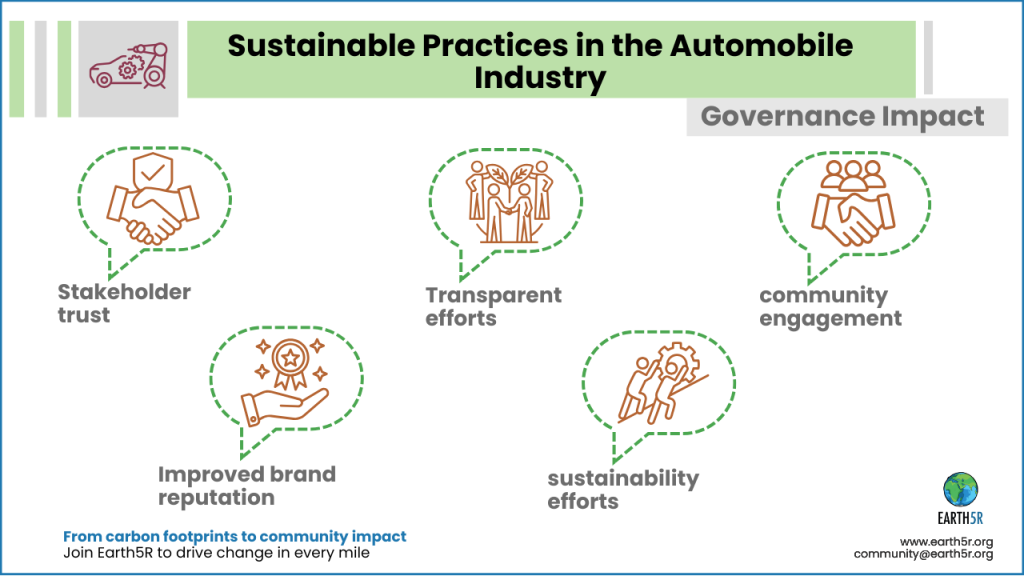
IMPACT ON AUTOMOBILE MANUFACTURERS
For automobile manufacturers like Toyota, Ford, Tesla, and Tata Motors, partnering with Earth5R offers a comprehensive approach to achieving their sustainability goals. By integrating Earth5R’s volunteer-driven model into their operations, companies can reduce their environmental footprint, enhance their circular economy practices, and build stronger relationships with the communities where they operate.
This collaboration allows automobile companies to not only meet regulatory requirements but also position themselves as leaders in the transition to a more sustainable and responsible industry. Through Earth5R’s initiatives, manufacturers can reduce waste, improve resource efficiency, and contribute to global climate goals.
THE ROAD AHEAD
Earth5R aims to expand its collaboration with automobile manufacturers by scaling up its sustainability programs across more cities and countries. By using Earth5R’s volunteer model, car manufacturers can drive large-scale environmental impact, contribute to the circular economy, and accelerate the transition to sustainable transportation.
About Earth5R
Earth5R is an ESG and CSR “Action” platform that empowers communities to take meaningful environmental action. Through its volunteer-driven initiatives, Earth5R works across industries to foster sustainability, reduce waste, and build a resilient future.
